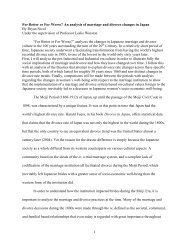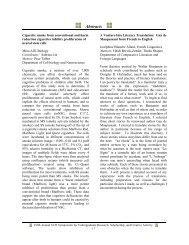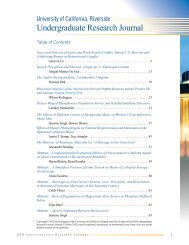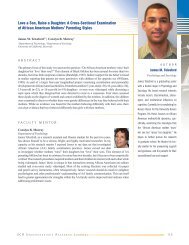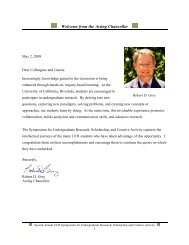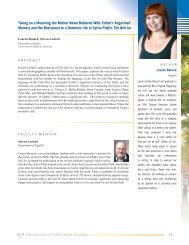UC Riverside Undergraduate Research Journal
UC Riverside Undergraduate Research Journal
UC Riverside Undergraduate Research Journal
You also want an ePaper? Increase the reach of your titles
YUMPU automatically turns print PDFs into web optimized ePapers that Google loves.
Augustan Era Policy on the Rhine Frontier from 34 B.C.E.-16 C.E.<br />
Kyle McStay<br />
set out from Mainz and again attacked the Chatti. After<br />
fierce fighting along the upper Main River, he defeated the<br />
Marcomanni, who afterwards migrated eastward. The army<br />
then turned north, crossed the Weser, and reached the Elbe<br />
River. Drusus became the first Roman commander to achieve<br />
this. For unknown reasons, Drusus did not cross the Elbe, but<br />
turned back toward the Rhine. At some point he suffered a<br />
broken leg, and died before his army reached the river. 22<br />
Tiberius took over command after the death of<br />
Drusus, and launched a new campaign in 8 B.C.E. during<br />
which, according to Velleius Paterculus, he traversed every<br />
part of Germania with no loss to his own army. 23 But<br />
what had Drusus and Tiberius actually accomplished? It<br />
seems clear that these five campaigns had been invasions,<br />
not conquests. The same tribes were attacked year after<br />
year, indicating that those tribes remained unconquered<br />
at the end of each campaign. For the time being however,<br />
the Germanic tribes east of the Rhine were unwilling to<br />
continue to fight the Romans, so it is probable that Drusus<br />
and Tiberius had at least succeeded in weakening the tribes<br />
and intimidating them into accepting peace; Augustus’<br />
strategy appeared to have worked.<br />
By this time, Augustus’ thoughts seem to have been<br />
turning away from simply securing Roman control of Gaul<br />
and towards incorporating Germania into the Empire. The<br />
willingness of the Germanic tribes to make peace and<br />
to remain peaceful, at least for the time being, appear to<br />
have convinced Augustus of the safety of Gaul and that<br />
Germania could be made into a province as well. Evidence<br />
to support the claim that Augustus was now turning towards<br />
the peaceful incorporation of Germania into the Empire is<br />
provided by the erection of an Altar of Roma and Augustus<br />
at Cologne (Oppidum Ubiorum) around 8 B.C.E., similar<br />
to the altar that had been erected at Lyons during the winter<br />
of 11-10 B.C.E. The altar signified allegiance to Augustus,<br />
and as Tacitus tells us, the priest of the cult was a member<br />
of the Cherusci tribe, 24 another indication of the believed<br />
loyalty of the Germanic tribes.<br />
Further offensive operations were deemed<br />
unnecessary, and Augustus was content with the planting<br />
of garrisons and the construction of additional fortifications<br />
along the Rhine and also along the Lippe. The cessation<br />
of preemptive invasions is further evidence that Augustus<br />
was now concerned with making Germania into a proper<br />
province, not with securing Roman control of Gaul.<br />
Germania seemed to be pacified, and indeed, Dio states<br />
that the area was slowly Romanizing with the presence of<br />
Roman garrisons, the growth of cities, the establishment of<br />
markets, and the introduction of peaceful assemblies. 25 The<br />
culmination of Augustus’ new policy of integration came in<br />
6 C.E., with the appointment of Publius Quinctilius Varus<br />
to the governorship of Germania.<br />
Varus’ career before being appointed governor of<br />
Germania was largely one of administration; 26 that he had<br />
not had extensive military experience is itself a strong<br />
indication that Augustus believed Germania to be ready<br />
to be fully integrated into the Empire. No other reason<br />
presents itself which can adequately explain why he would<br />
have appointed a man such as Varus to a governorship that<br />
had, until 6 C.E., been held exclusively by viri militares<br />
(military men). 27 It would appear that Varus had been<br />
appointed to do what he was accustomed to, which was to<br />
introduce peacetime administration. 28<br />
Correspondingly, Varus set out to speed up the<br />
process of Romanization. According to Dio and Velleius<br />
Paterculus, Varus began levying taxes and exercising judicial<br />
powers to which the Germanic tribes were not accustomed,<br />
nor were they disposed to accept this new imposition of<br />
authority. 29 The Germanic tribes began to lull Varus into a<br />
false sense of security by appearing to submit to his judicial<br />
authority, so that, as Velleius Paterculus states, “he came to<br />
look upon himself as a city praetor administering justice<br />
in the forum, and not a general in command of an army<br />
in the heart of Germany.” 30 In September of 9 C.E., word<br />
was brought to Varus that a revolt had broken out far from<br />
the Rhine. This was done to lure Varus deep into enemy<br />
territory, while simultaneously allowing him to believe<br />
that he was traveling through friendly territory, so that he<br />
might become lax on the march, which is apparently what<br />
occurred. 31 Accordingly, Varus set out with all three legions<br />
of his army, six cohorts of auxiliary infantry, and three alae<br />
of auxiliary cavalry, a force totaling about 21,000 infantry<br />
and 1,500 cavalry. 32<br />
This force was taken by surprise somewhere in the<br />
Teutoburg Forest, terrain that made it almost impossible<br />
for the Romans to deploy, thus negating all of their tactical<br />
strengths. According to Dio and Velleius Paterculus, the<br />
battle was a four day nightmare of ambushes and vicious<br />
close quarters fighting during which the Romans constantly<br />
tried to regroup and escape back to their bases along the<br />
32 <strong>UC</strong>R Un d e r g r a d u a t e Re s e a r c h Jo u r n a l



